How The Heck Do You Work With a Recruiter?…
transcript
How The Heck Do You Work With a Recruiter?
Here to read instead of watch? Click through the headings to a section of the full transcript, or scroll away!
- Sometimes Recruiters Suck: Transactional vs Relationship Building
- The Big 4 Questions You Need to Ask Yourself Before Reaching Out to a Recruiter
- Question #1 – What Excites You About Your Work? (with Prompts!)
- Question #2 – What Are Your Key Skills & Strengths? (with Prompts!)
- Question #3 – What Areas Do You Want to Grow In? (with Prompts!)
- Question #4 – What Are Your Career Goals? (with Prompts!)
- How the Big 4 Questions Help Recruiters to Help You
- Meet Maria – A Case Study On How the Big 4 Questions Help
- The 4 Step Process for Working with a Recruiter
- Step #1 – Connect (How to Meet Recruiters)
- Step #2 – Discuss (Meet a Recruiter & What To Expect To be Discussed)
- Step #3 – Interview (Meeting Prospective Employers & What to Prepare)
- Step #4 – Maintain (Keep Building Your Relationship With Your Recruiter)
- Meet Sanaa – A Case Study On Why It’s Important to Build & Maintain a Relationship
- How Recruiters Can Help You in Other Ways (with Examples!)
- Meet Emily – A Case Study On Using Recruiters for Salary Negotiation
- Green Flags – What You Should Look for In A Good Recruiter (with Examples!)
- Red Flags – What You Should Watch Out For (with Examples!)
- Vetting Questions to Help You Find a Good Recruiter (with Examples!)
(Edited for length and clarity)
So How The Heck Do You Work with a Recruiter is what I'm going to be talking about today. Ultimately, we'll talk about the why to use a recruiter, and the how of how to use a recruiter.
For those of you who don't know me, I am not in Vancouver, in your backyard, as many of you are. I am in Colorado.
My name is Lindsey Schultz. I'm the CEO of MRC Recruiting. My dad started our company 40-plus years ago, and I sort of had this serendipitous accident, or not, of joining the family business.
I have been doing this now for about 19 years, focused on the mining industry, and sort of have recognised that perhaps a strength and a weakness of mine is to say yes and figure it out later.
What that really means for me is, I generally just put my hand up and I volunteer. And that's how I'm here today. Holly approached me and I said yes, and I'm figuring it out as we go along.
I'm really excited to chat with all of you today, and I wanted to thank the Ute, Cheyenne, and Arapaho peoples in our backyard here in Colorado.
Sometimes Recruiters Suck: Transactional vs Relationship Building
Sometimes recruiters’ suck. (laughs) I assume that so many of you have likely been contacted by perhaps myself or others that identify as a recruiter. Maybe that's with a direct message through LinkedIn with sort of a brief position description or something, but with really no knowledge of who you are.
I think it's really important that we kind of get past this idea of having a transactional relationship. For me, the blind sort of reach-out with very little follow-up, or, as I call it, the bait and switch, where somebody approaches you and says, "Hey, this is a really fun, interesting opportunity. Are you interested?" and then they never call you back.
I try really hard not to be that model of recruiter, and I approach this and refer to it as a transactional approach. They only call you when they need you. And we want to get away from that.
How do we fix it? We build a relationship. Just like you guys sat in networking rooms, and we shared stories, and we talked about funny emojis, I think that there's a lot of opportunity to connect with recruiters in a way that lets them get to know you, and for them to get to the core of what they do, which ideally is being an asset to you in your transitional phase.
My goal as a recruiter is to move away from that transactional to building a relationship. And I call it a win-win-win. A win for my candidate, which is the individual looking for a role, a win for my client, because they're super excited that they've got the right match, and ultimately that winds up as a win for me as a recruiter.
That protects everybody's mutual interests and long-term goals and moves us away from this idea of a transactional relationship into love.
The Big 4 Questions You Need to Ask Yourself Before Reaching Out to a Recruiter
How to prepare. I think that there's several questions that you can really think about in advance, and I call these the big four. It's always nice to do a little bit of self-reflection as you ponder what might be next for you in the world.
Question #1 – What Excites You About Your Work? (with Prompts!)
The first one that I really think is worth talking about is, what excites you about your work? This question, for me, is a starting-off point. Often, we get really stuck in that day-to-day and the grind, and we think, these are the things that we do.
We're looking at spreadsheets, we're doing whatever it is, and we lose all the lustre. When you say, "What excites you?" I get to watch people light up and say, "Oh my gosh, I helped somebody do X, Y, and Z, and I'm really excited about that."
So, think about it. What excites you about what you do? Is it technical challenges or people management, processes, or change?
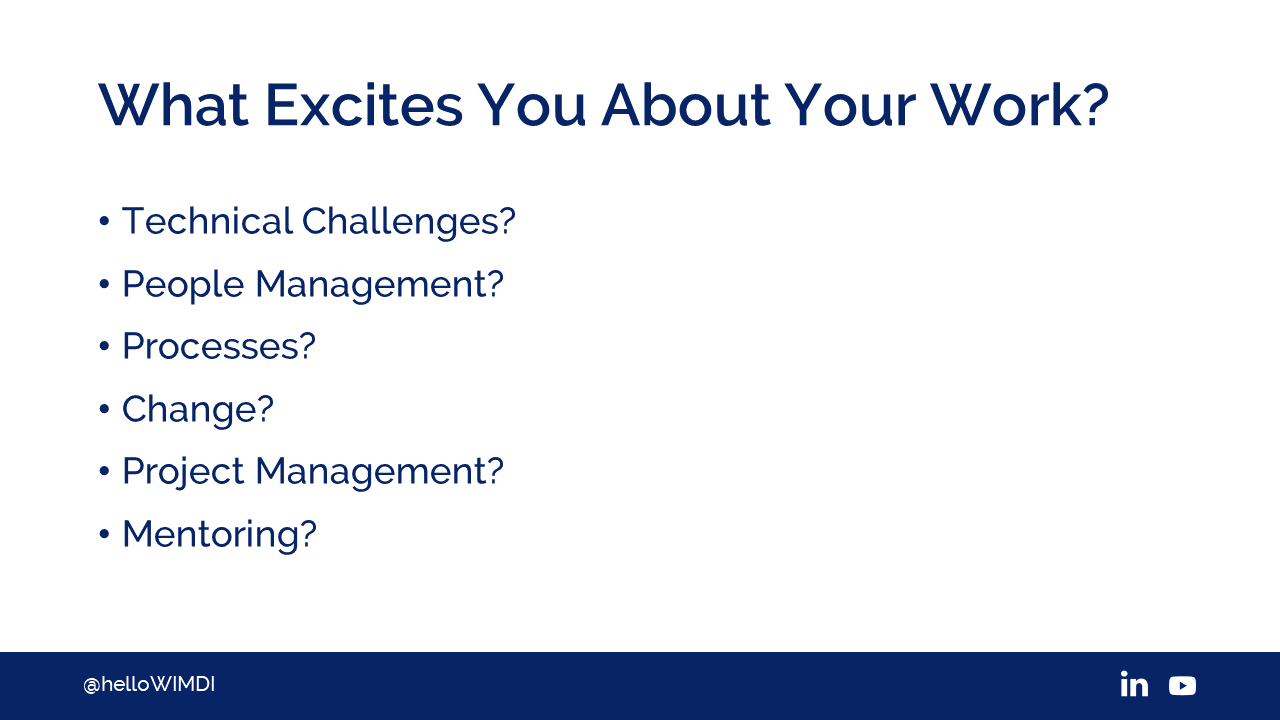
There's a whole slew of things right here. I tend to notice some themes when I ask people what gets them excited about their work, and you guys are doing a really good job of reinforcing that for me.
Often, they tend to be areas where it takes time to build up to them. So, collaboration, problem solving, change management. All these areas get us to collaborate and work with one another and identify what we're really great at to propel forward.
I almost never hear somebody say, "I just really love pressing out spreadsheets. That is my jam."
Question #2 – What Are Your Key Skills & Strengths? (with Prompts!)
What are your key skills and strengths? This really drills into identifying some of the core of what you might be great at. This just gets us talking about some of the things that are core to what we do. And they tend to be often in what I do, like, technical areas. It could be technical design, communication, strategy, critical thinking.
We've got problem solving in here, but that can light you up too. There's a lot of opportunity in the key skills and strengths to say, "Oh, hey, I forgot that I am great at X, Y, and Z areas."
A lot of people, particularly if they're looking for a new role, wind up forgetting that they're amazing. This is an area that I love asking about and hearing people sort of reignite and discover the areas that they're really excellent at or haven't thought about in a while.
I always suggest that people write down some of these. Keep a spreadsheet, right? As you learn the new skill, as you achieve something at work, just plug it on there, because we forget all the time how fabulous we are and all the things that we're learning.
Maintain one, whether it's on your phone or a spreadsheet or whatever and go back to it when you need to update your resume.
We think of what key areas we are great at as hard skills, and they can absolutely be soft skills. They can be skills that take us a longer time to achieve. But again, getting them all in one place so you can look at them at a later point is something I absolutely suggest doing.
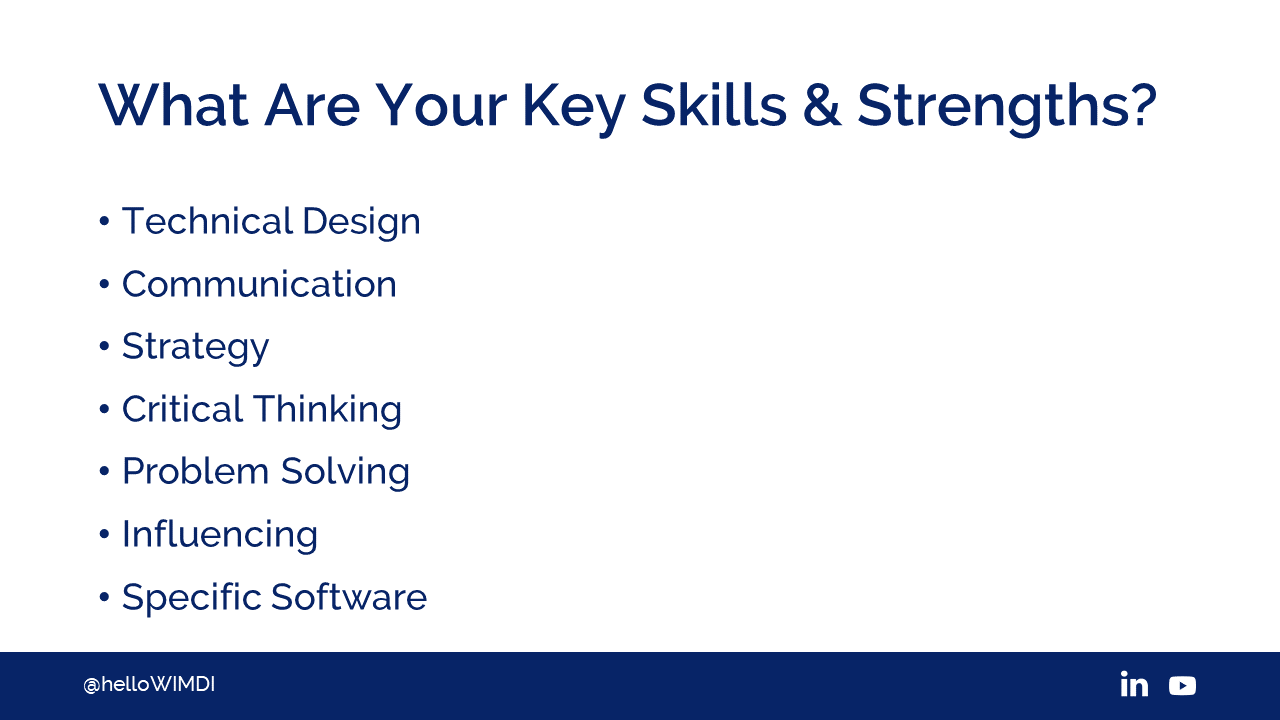
Question #3 – What Areas Do You Want to Grow In? (with Prompts!)
What areas do you want to grow in? And this is a really fun area to reflect upon. Sometimes this is one of the areas that people struggle with because it's asking you to perhaps look at the last two questions and really use those to move you forward.
Or not, and say, "What have I not done yet?" You know, it's taking a leap. It's doing a lot of different things and going into that area of change, where sometimes it's a little bit uncomfortable, and using coaches and other things, like what Holly has done, and totally pivot.
Sometimes we recognise that that's part of what we want to do when we start really drilling into a good conversation of areas that you want to grow in. It could be any of these areas, including presentation skills, which is something, for me, that I always want to grow in.
Executive presence, global perspective, stakeholder management. Having difficult conversations is always right up there. Figuring out how to negotiate is one that I hear really, often. And so all of these are some options for you all to think about.
Growth is a journey. And how do you want to evolve? What areas do you want to grow in? What does evolution look like for you?
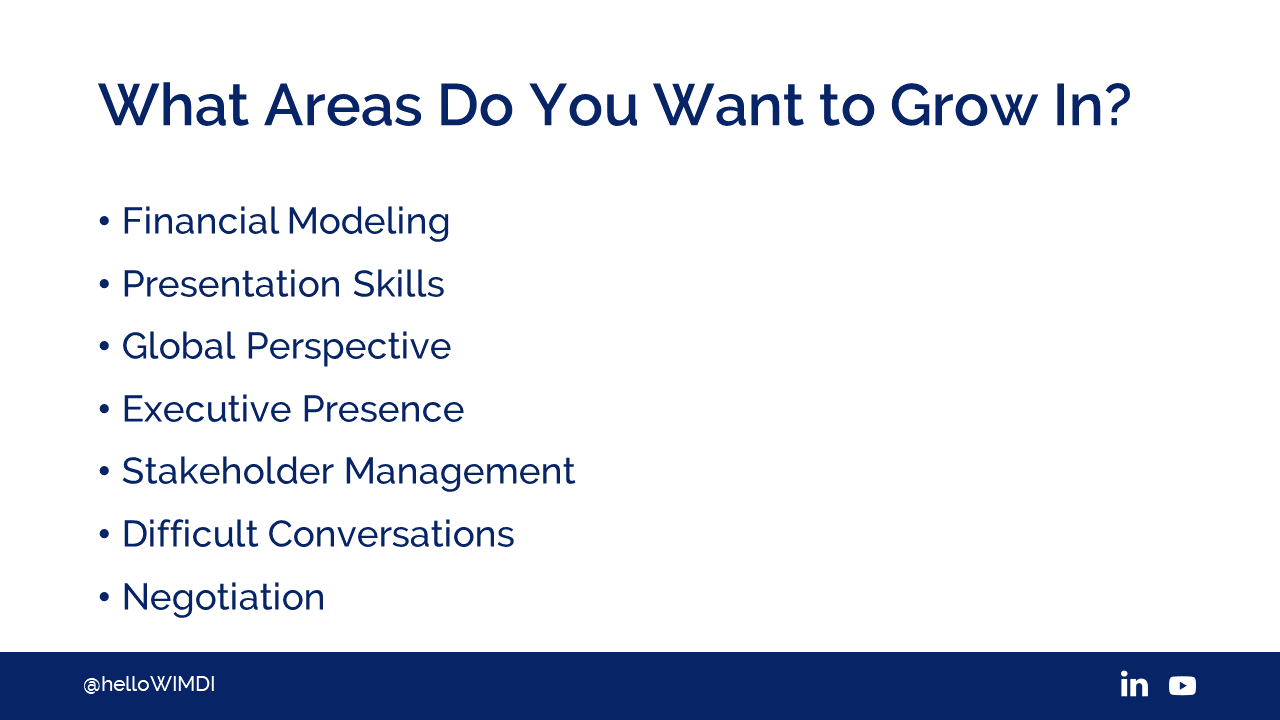
I feel like if I can't answer these questions myself, that I can't ask other people them. Mine changes on occasion, but at the moment mine is focusing on the ask. Asking for help, asking for things that I need, asking other people to contribute. It's trying not to feel guilty about asking for help.
Question #4 – What Are Your Career Goals? (with Prompts!)
The last of the big four for me is, what are your career goals? This takes the last three and tries to build upon them. Ideally, this leads to a point where individuals are identifying that they are pretty awesome, that they're unique, that they're interesting, that they've got a great skill set.
They can be ambitious and bold and interesting in a lot of different areas. And then say, "What are your goals? Let's do this."
It could be working on another continent. It could be expanding cross-functional knowledge, promoting yourself within a ridiculously large organisation, becoming a thought leader, all kinds of these things.
I love hearing the goals from people that I get to work with, because then I get to help them realise them sometimes or give them the confidence to ideally pursue it.
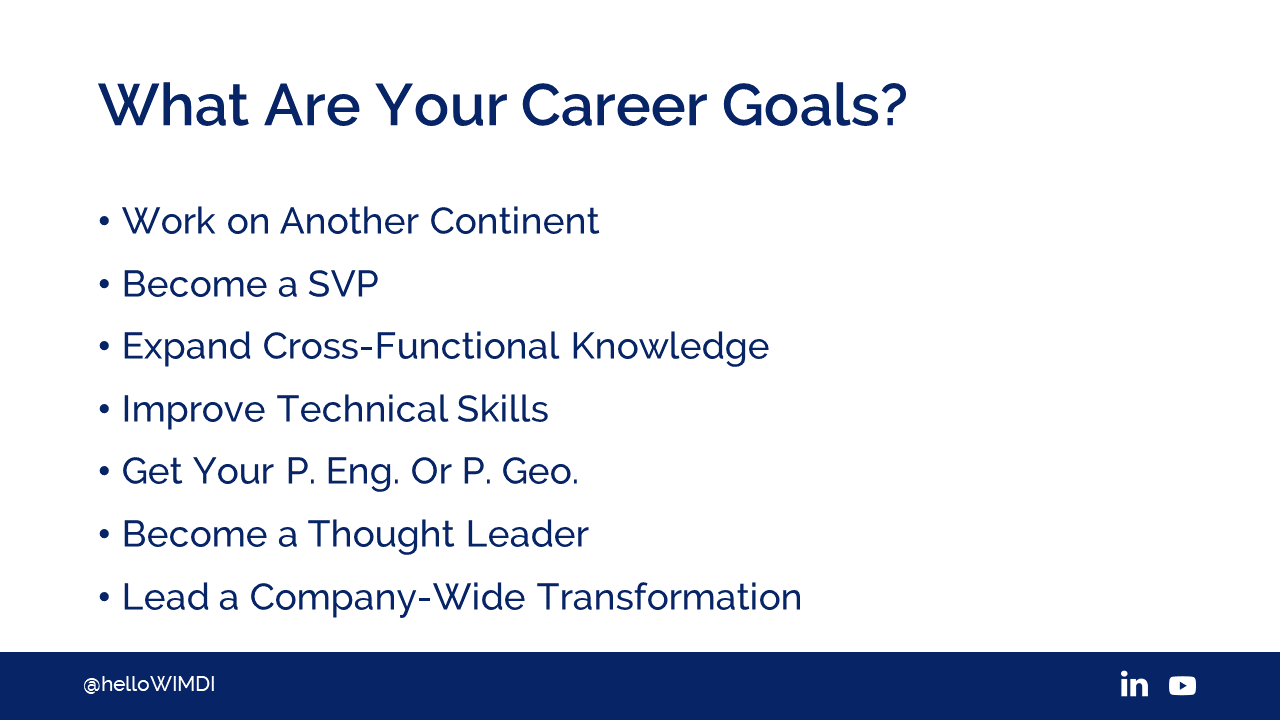
It’s moving away from that transaction, but having a really core relationship with someone and saying, "Okay, I get it." Or, when I'm approaching you about a job that you're not interested in, then tell me to go booger off.
How the Big 4 Questions Help Recruiters to Help You
All these conversations, these big four questions, as I call them, really help me or help recruiters help you. Some of what I think is really important to note is being honest. And what does being honest mean? That doesn't mean I expect you to lie to me. (laughs)
That means that I come from the idea that everybody is going to come from being honest. Let me know what your circumstances are. Sometimes we have really hard conversations.
Sometimes people go to a recruiter because they've realised that there's a glass ceiling, because they do not have leadership that is helping them grow or learn or pursue what they're really great at. Or you've been siloed into an area that you just are not passionate about.
Having very honest, open conversations about where you're at and what want, really is helpful from my perspective as a recruiter. Because it probably isn't just you, right?
I think sometimes we feel really, really isolated because we think that we're the only ones balancing work and family and commuting and a kid who rides horses at five o'clock in the morning, or, you know, having another, you know, weird commute, or any of these sort of life circumstances.
And the more I know, the better I can help find something that really is a good fit. So, beyond that, I ask individuals to think about being specific, as best we can. What are deal breakers? Is it a location? Is it compensation? Is it having a specific culture? Is it having some autonomy or flexibility?
These will lend themselves, as well as the last four questions, to my asking you to be a little bit vulnerable and show me your unique. That is being sort of authentically you.
I love learning about people and all of the interesting compartments, right? Sometimes that's all of the personal things mixed with your professional aspirations, but it paints a picture.
It helps us to understand what gets you ticking. I think that it's a uniquely female trait, on occasion, to not want to ask for things. I'd mentioned that earlier that I have a hard time with it.
But nothing makes me happier than when I'm contacted by somebody who says, "I don't know what I want to do next, (laughs) but I would really like to chat with somebody about it and get your perspective. I think this is what I want to do, and these are the areas that I'm great at."
So take up recruiters' time. Use us as a resource. We are there for you to ask questions or ask us for information or ask for help. So do what I am not good at and give us a quick call and say "Help," or "Let's chat."
Meet Maria – A Case Study On How the Big 4 Questions Help
I've got an example for us. I want you to sort of meet Maria. This, from my perspective, is a great example of how to work with a recruiter, or how to engage.
Maria was someone that was referred to me by a mutual connection. She was at a crossroads in her career, where she recognised perhaps, she had outgrown her organisation, and she may not be promoted beyond what she's doing.
We connected and talked about the big four, what to expect and how to navigate some of these complexities and sometimes self-limiting beliefs and come up with a path, moving forward.
Ultimately, she had some really, really amazing insight into herself, what she wanted to do, where she wanted to grow. And I said, "We've got to redo your resume. It does not reflect at all what you're great at or this passion or this spark or anything else."
We worked on her resume, and rebranded. It's not a full pivot, but it's going to focus on more leadership and mentoring and growth areas for her, as well as her ability to provide that for others.
Now, with this rebrand, she has the opportunity of looking at some very, very different types of roles. She's got a great background to do that, but she didn't recognise that she had been doing this her entire career.
It was only through her being really honest and saying, "Okay, this is what I loved about this role, and this is what I loved about that role." And I said, "Well, look, the common fibre here is that you've been in leadership roles, and you've had teams that were understaffed, and you've had people that needed to be upskilled. And you've gotten there, and you've achieved big things. You've helped promote them, you've helped promote yourself."
This conscious rebranding got her really excited. And at that point, it felt like the best thing to do was to connect her with others. I did not have a role for her. Not at that moment and not now even.
We maintained staying in touch and connected with maybe three or four individuals, and one of those is a coach. I don't have an end in sight, but this is my version of things not being transactional, right? We're helping, we're getting in there, we're understanding one another.
I'm a resource for her. I love seeing this growth happen. And so, we're just waiting to see where she lands. One thing that's important to remember is that building a relationship with a recruiter may not render immediate results.
A good recruiter is not always somebody that has a job for you now. It may be somebody that you build a relationship with that will find connections or a role for you, as that relationship continues to evolve.
The 4 Step Process for Working with a Recruiter
It’s the starting point of what I'd like to talk about next, which is how to work with recruiters. So you're probably thinking, "Okay, you've told me this story. (laughs) You've told me all these questions. How the heck do I actually get this going?"
Where do I find them? How do I connect with them? What do I even say when I do find them? We've broken this down really into four steps.
The first is connect, the second is discuss, the third is interview, the fourth is maintain.
Maria was a great example of really going through those. This is putting that into some distilled steps to think about, moving forward.
Step #1 – Connect (How to Meet Recruiters)
Breaking that down a little bit further, connecting is you can meet them from referrals, friends, colleagues. Networking events is one of my favourite things to do in terms of meeting candidates for myself or really reaching out to others.
Conferences are another really excellent place to make a connection with a recruiter. LinkedIn and Google are also reasonable places if you're really doing an active search.
That that's something important to have a conversation about, because looking for a recruiter and connecting with them goes hand in hand. When you're sort of looking them up on LinkedIn and Google, type in what you're looking for.
If it's a specific industry like mining, you know, there are a few of us out there, but finding one that will meet your needs. Those two areas would be great places to start connecting with them.
In terms of what connecting looks like, recruiters are flexible. We're communicators by nature. It can be phone, email, LinkedIn, text, WhatsApp, our websites. We're really, really flexible about how we can be contacted.
An example of an easy way to connect would be through LinkedIn. And just say, "Hey, I see that you're a recruiter in the mining space. And I've never worked with a recruiter before, and I would just really love to learn more about what you do and how I might be able to explore opportunities through you."
An email could look something like, "Hey, I discovered your website while I was searching for a recruiter, and I applied through it. I'd love to have a call with you."
Let's be honest, almost no one calls anymore out of the blue. But in the rare event that you're feeling spicy, and you want to make a phone call, you know, you can say, "Hey, I'm X, and I found your website, and I'm calling."
It probably would be equally shocking to have somebody actually answer the phone when you did that. In the spirit of transparency and being real, you can also leave a voicemail and just be brief and specific and say, "Hey, my name is Betty Lou, and I'm looking to partner with a recruiter, or at least learn more about what you do and your services. And if this might be a match, I'd love to have a conversation."
Remember it's okay to ask for something. Remember it's okay to do a cold reach-out. And I always use the anecdote, if you want to make a friend, ask for a favour. I think that's a Benjamin Franklin quote at some point that I've bastardised.
But we want to hear from you. And if I don't have to find you, I'm excited. So please do reach out.
I think another thing to note here would be what happens after you do that, right? I would like to set the expectation that your email, your phone call, your LinkedIn message will be responded to within a reasonable timeframe.
It will likely look like something like, "Oh, thanks for contacting me. I'd love to get in touch with you. Let's set up a call." It really is not super complicated. They may ask you to fill out some forms. They may ask you to go through their ATS. All of that is okay as long as you're comfortable with it.
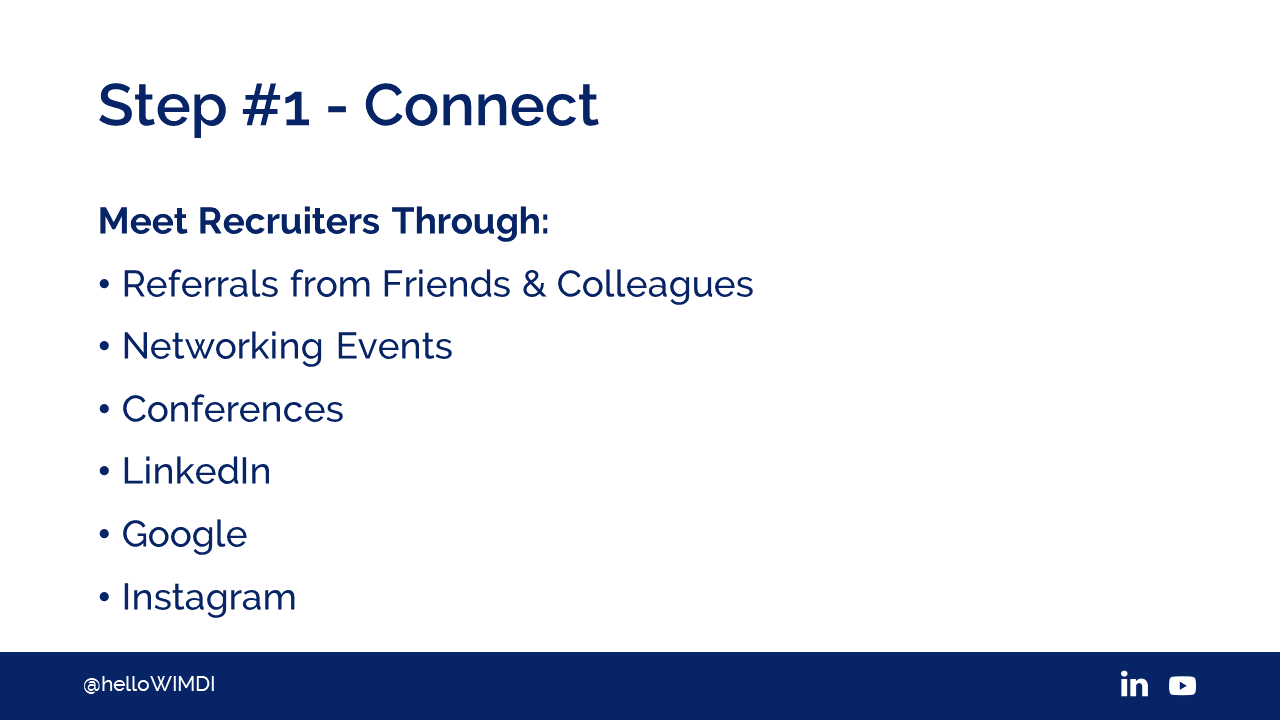
Step #2 – Discuss (Meet a Recruiter & What To Expect To be Discussed)
The second step that we talked about at a high level is discuss. This has a few different parts, but ultimately first, I call it an intake or an introduction call or a hello call, where both sides know relatively little.
I would be prepared to discuss the big tell me about yourself question. Why are you looking for a new role? You know, not all recruiters use the big four, but I certainly do. So I put that in there, talking also about some desired location, salary ranges, some of the really tangible elements that we need at the front end to sort of build this relationship and understand what candidates are looking for.
That's the first call, be it 15, 30 minutes. Sometimes that goes into various iterations of this call. We go and do a deeper dive where maybe it's the big four for a second call, and it's a little bit longer. But generally, a quick hello call is a nice way to kick it off.
Just assessing fit, making sure that both sides are comfortable, and then doing a follow-up call where you can do a deeper dive.
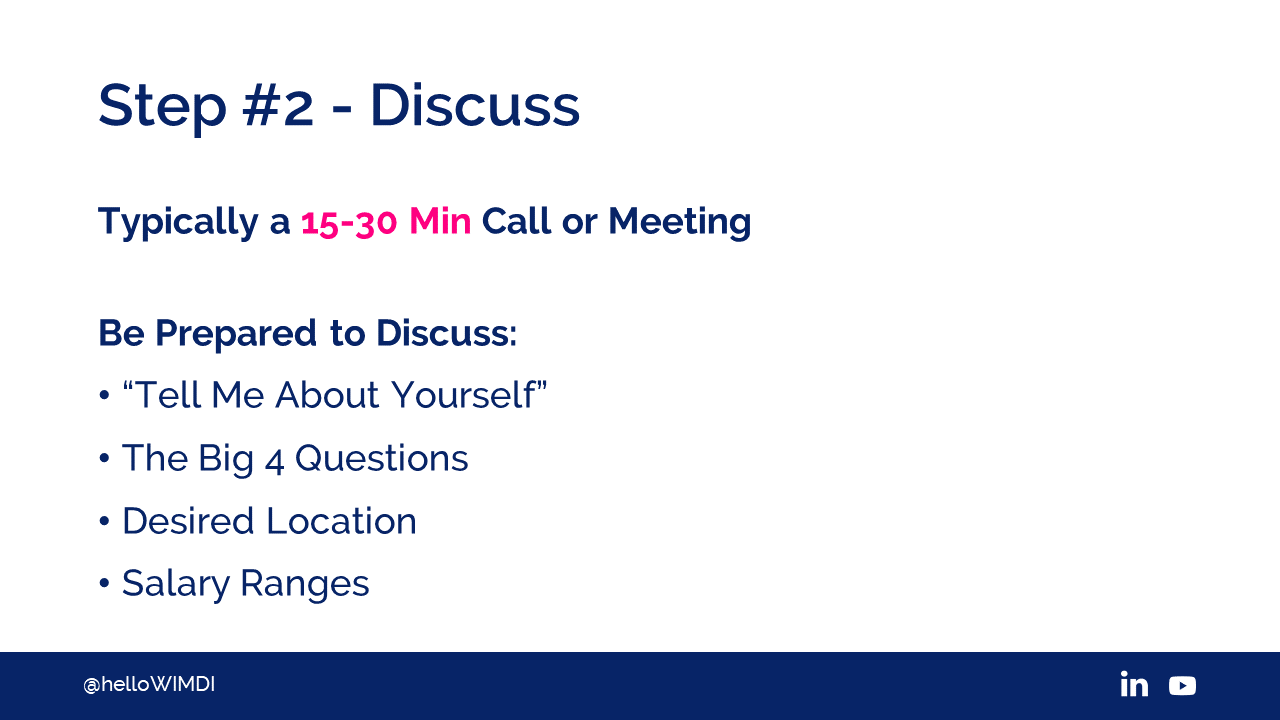
Step #3 – Interview (Meeting Prospective Employers & What to Prepare)
The third step is interview. And when I say interview, I really mean ideally interview with perhaps a client that a recruiter is representing.
Some of the areas that I would suggest being prepared for in an interview phase are getting there early. Whether it's a video interview, a phone call, you know, just be ready for it. And then, certainly, an in-person interview, arrive on time, if not early.
Dress in a way that makes you feel comfortable or that's appropriate for where you're going and what you're doing. Ensure that you've done your homework on the company through their website or news releases, however that makes most sense.
Tell me about yourself. Why are you looking? What are you doing? Why is this interesting? And then I like to say, prepare a few success stories. And these can be canned, right?
Use that same idea of jotting down what you're doing, as you're doing it throughout the year gives you that information at top of mind. Go back through your resume, call your recruiter and get a pep talk. This is my favourite part.
Right before the interview, I am your hype person. (laughs) I want you to be excited and ready and well prepared.
Then just have a few questions prepared. Sometimes those questions may get answered through the interview. I just like to throw something else that's weird in there. Like, what do you like about working at this company? You know, what keeps you here? What does a day look like? What is a circumstance that's been difficult for you to manage through that you think would be relevant for me to understand in this role?
It's okay to interview your interviewer, and I think it's, in fact, very important, because it gives you a lot of insight. Sometimes it throws them off, and that's okay too. Know your audience, but absolutely ask questions.
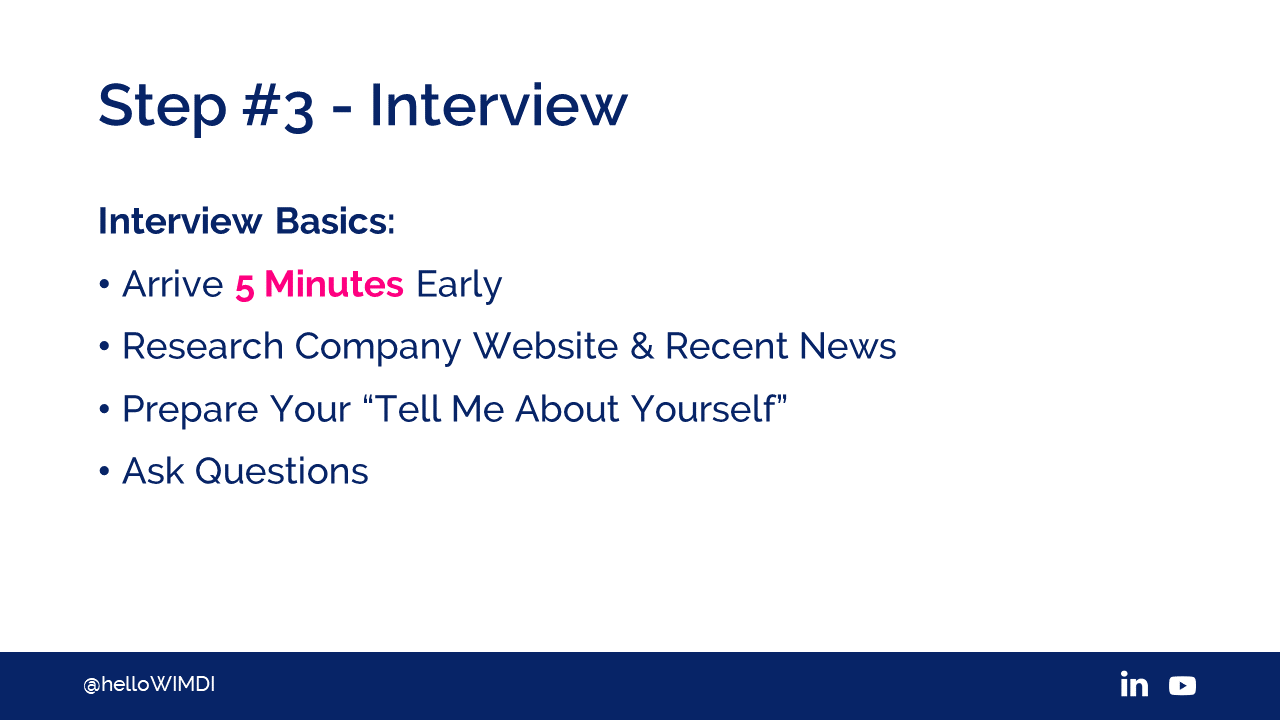
Step #4 – Maintain (Keep Building Your Relationship With Your Recruiter)
Step four is maintain. Again, I think Maria is a great example. We've been staying in touch but maintaining the relationship. Just create some touchpoints. Every three to six months as a candidate, feel free to send a LinkedIn message, give a call, send an email.
Recruiters should also be doing this, right? Just touching base with you. Hey, what's going on? What's new? How are you doing? Are you hanging in there? Got you on my radar. Whatever that looks like.
Anytime there are updates or something significant, if you thought you knew what you wanted in the first call, and that's sort of evolved, feel free to say, "Hey, I think it's time for an update call. Let's do it."
Or even just sort of the reintroduction meeting, where you meet up at an industry conference and say hi and have a coffee and shake hands and get face-to-face.
You can call and say, "Let's talk through some various ideas." And always, again, feel free to ask for help or ask for advice. Say, "What should I be doing? What should I be making? Should I be posting on LinkedIn?" Whatever that looks like. Maintain that relationship.
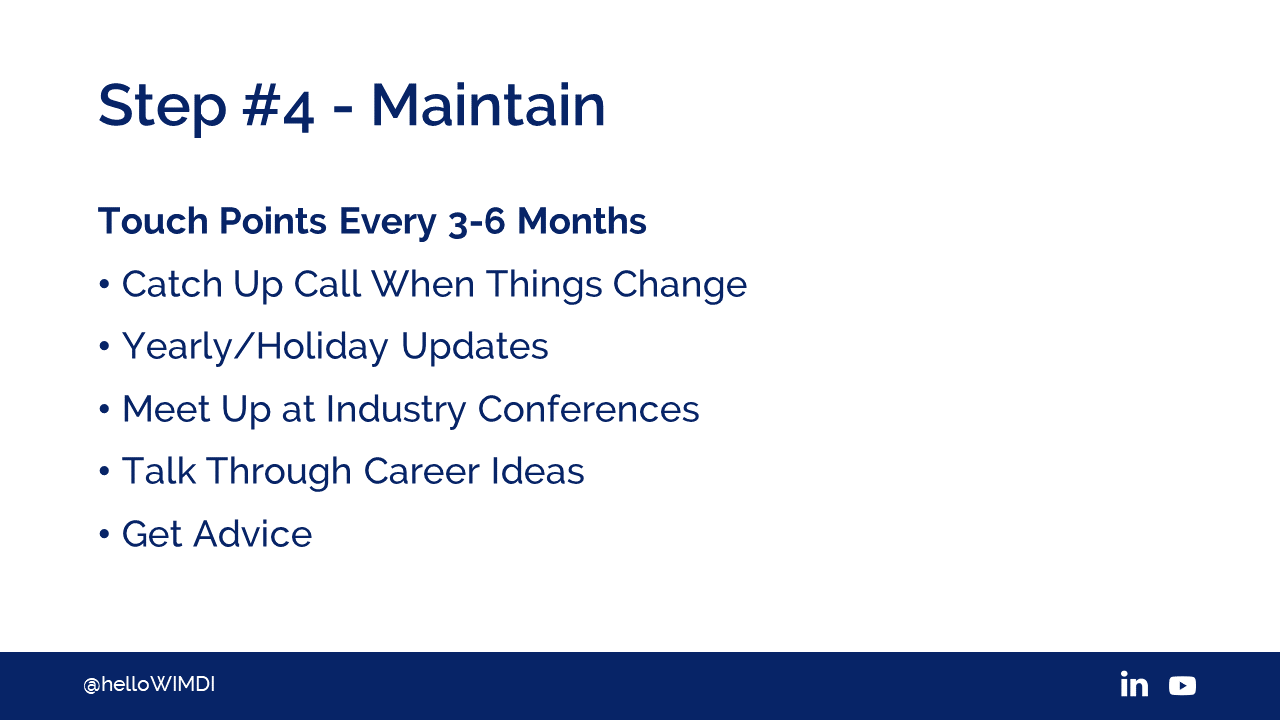
Meet Sanaa – A Case Study On Why It’s Important to Build & Maintain a Relationship
What happens next? Let's talk about Sanaa. This is a great example of how to maintain a relationship.
I was introduced to Sanaa from her advisor, and he had suggested that she just needed a resource. She was going to graduate and needed to explore the job market and had no idea what she was really going to get herself into. And could I help? Absolutely happy to help.
I had known her advisor for a number of years, and so I really trusted his judgement. And he's always brought really interesting individuals. She had a non-traditional background. She had a career prior to joining mining and getting a master's degree.
We had a really good conversation. She followed up and did all the things that I asked her to do in terms of working on her resume and connecting with a few others.
We got aligned in terms of what she might be able to expect and fixed her resume and leveraged her experience to using her history into moving into her next degree.
This was all really, really relevant. We had been maintaining this touchpoint. I randomly got a phone call from a client, and they said, "I need a person with this background mixed with this, because the role's going to evolve, and we have a really small team."
They need wastewater management with a mining engineering degree and sensitivity to some environmental and all this other stuff. And it was like, oh my god. The light bulb literally went on, and I thought "I know exactly who to call."
I don't know anybody else with this background. I called Sanaa, and I said, "Look, I got a phone call. I haven't posted the job. I think that you are literally perfect for it."
She started doing her research, she thought that the company was interesting, and bam, got herself a job. It was the easiest search I have ever done, and it came from maintaining a relationship: one with her advisor, and two with her.
They both did a great job of following up and saying, "How do we just stay in touch?" This is one of my favourite stories because it was magic. And it just comes by developing those relationships and maintaining them.
How Recruiters Can Help You in Other Ways (with Examples!)
What else can recruiters help with? And having been a recruiter for as long as I have, I have to admit that I love connecting people, I do love recruiting, but I love all of the grey area around recruiting. So, this question is one of my favourites.
Recruiters can help with a bunch of stuff. You can ask questions like, "What should my title be? I don't think what I'm doing is really reflective of my title. What should a salary range look like for me at this level? How could I improve my resume? What are some resume trends looking like? I keep seeing different articles. AI is influencing stuff. How can I improve this and just keep this in my arsenal if and when I might need anything?"
You can ask about relocation packages and what that typically looks like so that you can understand that. I think that another area that I really like to talk about is career and leadership development resources.
I really enjoy following coaches and, you know, short courses and other things like that that are relevant in the industry that I work in, which is mining. Having those in my arsenal to give to other people as resources is something that's really rewarding and keeps us connected.
Generally, I get to learn from others because they come back and tell me all about it. And then I can decide to pursue it or just, you know, absorb their knowledge vicariously.
Introductions. I always say that this is part of maintaining the relationship. I'm a connector by nature, and so without expectation, I am very happy to work with candidates, work with others, and say, "Hey, you should know X, Y, and Z. They're in your backyard. I think you guys would be great friends.
Or, you know, have a chat about whatever it might be that you're interested in. Or leverage one another to figure out how to break that glass ceiling and figure out what's next." So, recruiters can be pretty helpful. Make friends with a good recruiter.
Meet Emily – A Case Study On Using Recruiters for Salary Negotiation
Meet Emily. Emily had a role. Emily didn't want a new role, but she hadn't had to negotiate a salary for herself.
There were annual reviews and performance reviews coming up, so she contacted me and said, "Hey, I remember we met at a conference, and you said, 'Use a recruiter as a resource.' And so that's what I'm trying to do. Can you help me sort of isolate and figure out what perhaps a salary range looks like for somebody with my experience, in this area, et cetera?"
I honestly had done this a few times, but I hadn't been asked so explicitly. And certainly not from somebody who really took the bull by the horns in the way that she did. I loved the question, and it gave me an opportunity to do some research and dig in for her.
I got back to her with some examples of titles and roles and things like she was doing. And several months later, I got a note on LinkedIn, and she said, "Thank you for your help. I got an awesome raise, I got a huge bonus, and my boss told me I did a great job advocating for myself."
So, it was a proud moment where I thought, "I helped somebody." Ask for help. It makes everybody feel good. And sometimes you wind up being the absolute winning recipient, where you get to negotiate a raise for yourself and advocate for yourself and learn how that process works.
Even though I didn't facilitate anything other than providing salary data points, I'm still super stoked on it.
Green Flags – What You Should Look for In A Good Recruiter (with Examples!)
So how can we identify a good recruiter? Because we love some good green and red flags here, let's dig into it. Green flags would be the positive side of how to identify an awesome recruiter.
I think we've talked about a lot of them today, but just trying to put this into some bullet points for you.
A good recruiter is going to ask detailed questions. They want to know about you. They should follow up with you quickly. When I say quickly, recruiters are busy people, and setting those expectations will vary between certain ones.
I read an article recently, and it said candidates expect follow-up or feedback or a response within 48 hours. Quite honestly, if you email me on a Friday afternoon, 48 hours is really fast. That means first thing Monday, you want a response from me.
So, I'm here to set the record straight. It might be more than 48 hours, but you might get an email that says, "Hey, I am, like, underwater, and I would love to chat with you. Hang in there for a second." But they should follow up with you relatively quickly.
A good recruiter should have enough information on you and have those questions that I call interested questions, which means they want to know about you, so that they can showcase your skillset.
Showcasing your skillset means you should be comfortable with how they present you in writing or verbally. It is absolutely okay for you to ask a recruiter, "How would you pitch me to your client?"
I think that that's a great vetting question. Make sure that they can showcase your skillset. If they ever say something that makes you feel like, "Ooh, that's not really me," speak up.
Another area for green flags would be to give you a rundown of what to expect. What is the process with them? What is the process with the client? What is in store for you, moving forward?
If they can't clearly articulate that, you might have pause. Ultimately, a good one should say, "This is what you can expect from me."
Another green flag for recruiters would be sort of willing to help. Again, this is building a relationship, this is maintaining a relationship. These are all of those little areas that we just talked about in terms of being able to help.
Then the last one that I think is really important, especially in this day and age, is asking before they give your contact information to anyone. Recruiters are notorious for having large databases of candidates. They have big LinkedIn networks.
I think it's critical that recruiters make sure that candidates are: one, interested in the opportunity; and two, have the information to pursue that appropriately; and three, that they say, "Yes, I want to pursue that."
So, you know, this goes to having a really strong consensual relationship and knowledge of what you're being put forward for. And there's lots of horror stories around this not being done.
You can also ask for data privacy. You know, details on how they keep your stuff safe. We have it on our website so that everybody knows.
You can always ask to be deleted. If you ever have a moment where you're thinking, "I do not want to be represented by this person. Please remove me." That’s something that you have the opportunity to ask for.
So, a green flag is them saying, "Hey, here's a role. Are you interested? Here's all of this stuff." and then you saying yes.
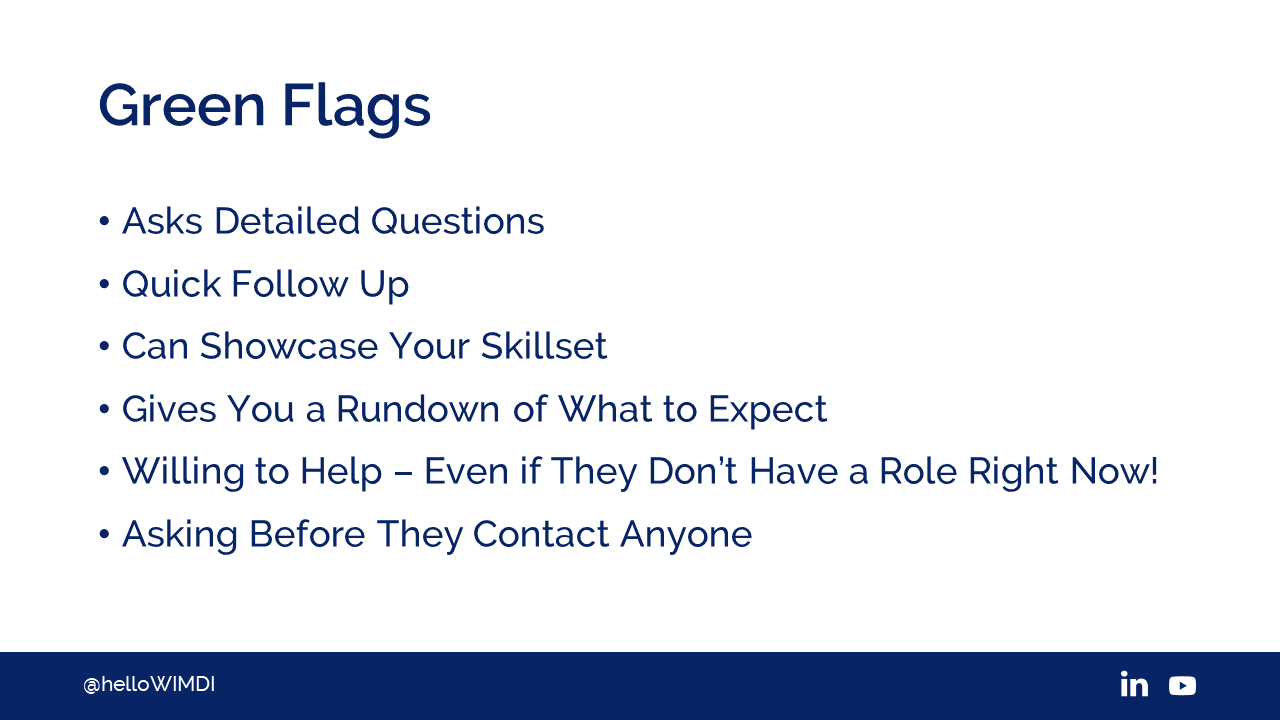
Red Flags – What You Should Watch Out For (with Examples!)
That leads us into the red flags. Red flags for me are recruitment agencies that don't have a phone number or won't talk to you on the phone. It is an absolute pet peeve of mine.
I know that we are in the digital age, and that everybody prefers not to be on the phone anymore. But if there isn't a clear phone number or contact information or principals at the organisation, or they will not call you back, give yourself a minute and think about it.
The next one is you don't want a recruiter to rush you. You don't want them to make you make fast decisions because they're in a hurry. This process is really about you and the client.
Sometimes the client could say, "I really need this person to make a decision, blah, blah, blah." They should be very clearly stating what they need, the timeline, all those things. So, setting up the expectations from green flags. Rushing you through the process is the opposite of that.
Again, sending out your resume without consent. That's a big no for me. Some recruiters use candidates as bait. They'll say, "I've got five really great people." They might remove your name from it, but sometimes very little else.
In an industry as small as mining, that can become quite an issue. And I'm sure that you have other similar circumstances where you just wouldn't want somebody to send it out without your consent. You don't want your stuff out there without knowing what you're being set forward for.
Another area that I would advise against is having a recruiter that says, "Hey, sign this exclusivity agreement. Only work with me. You are mine." There is no ownership. It doesn't work for you. You can be represented by as many recruiters as will have you, for as many roles as are out there.
It is yours to figure out what to win, what to lose, what to take, what not to take. So, I would avoid signing exclusivity agreements.
We talked about bait. Again, that's just a recruiter's way of trying to get new business, or using you to leverage new business, and I just disagree with it.
The last one is if a recruiter says, "Oh, I'm going to charge you money for these services." Recruiters are paid by the companies that they're working for. There are other kinds of agencies that you may work with as a candidate that may ask for payment, but a recruitment agency is not one of them.
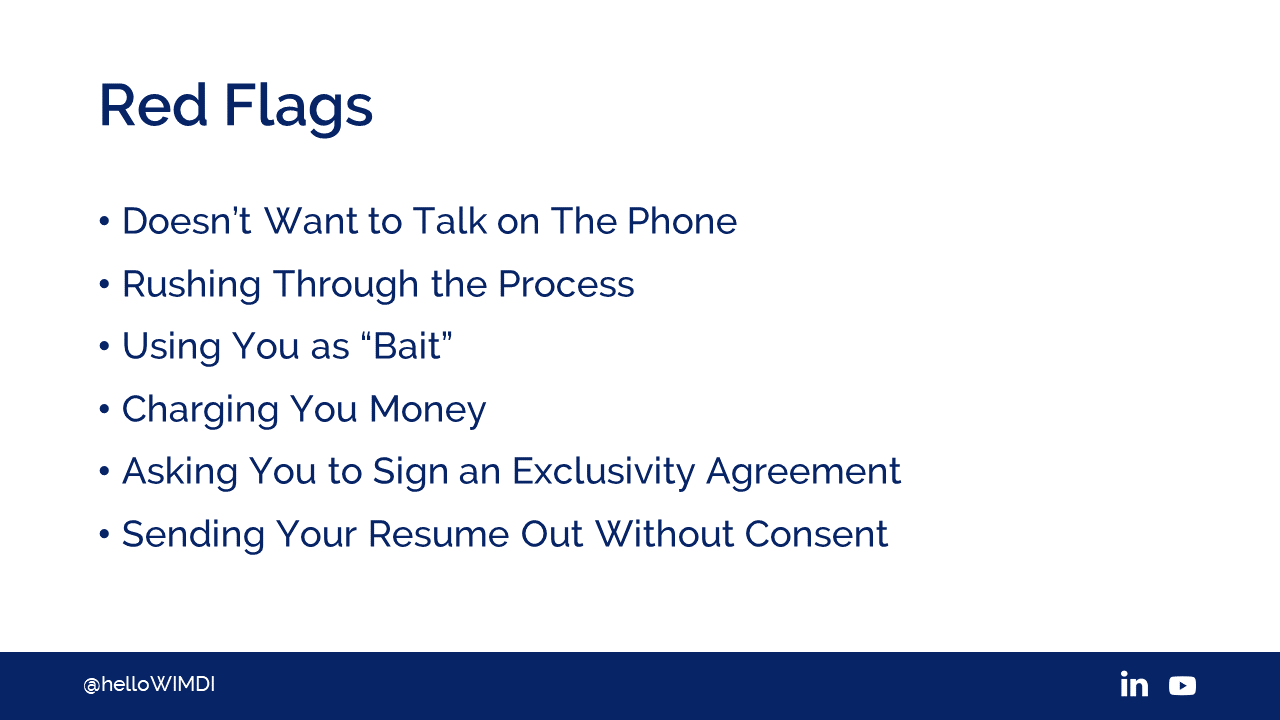
Vetting Questions to Help You Find a Good Recruiter (with Examples!)
Vetting your recruiter, as I've mentioned a few times, is really, really critical. We talked about this, but you can say, "How long have you worked in the industry?"
This is part of when you do that first call. How long have you worked in this? I saw your website. These things are interesting. Maybe how many placements have you made? How do you handle my confidential information? Give me an example of how you would pitch me to one of your clients after this conversation.
If you don't like the answers, then you can just pump the brakes. But I think it's really, really important that candidates feel good about those who are representing them. So, it's really a good idea to ask some good vetting questions.
Another area that I would say is ask them how you might be removed. Most of them will have a good opt-in/opt-out system. We're fairly technologically savvy, and so if they do not have an easy way of removing you from stuff, again, might not be the right fit.
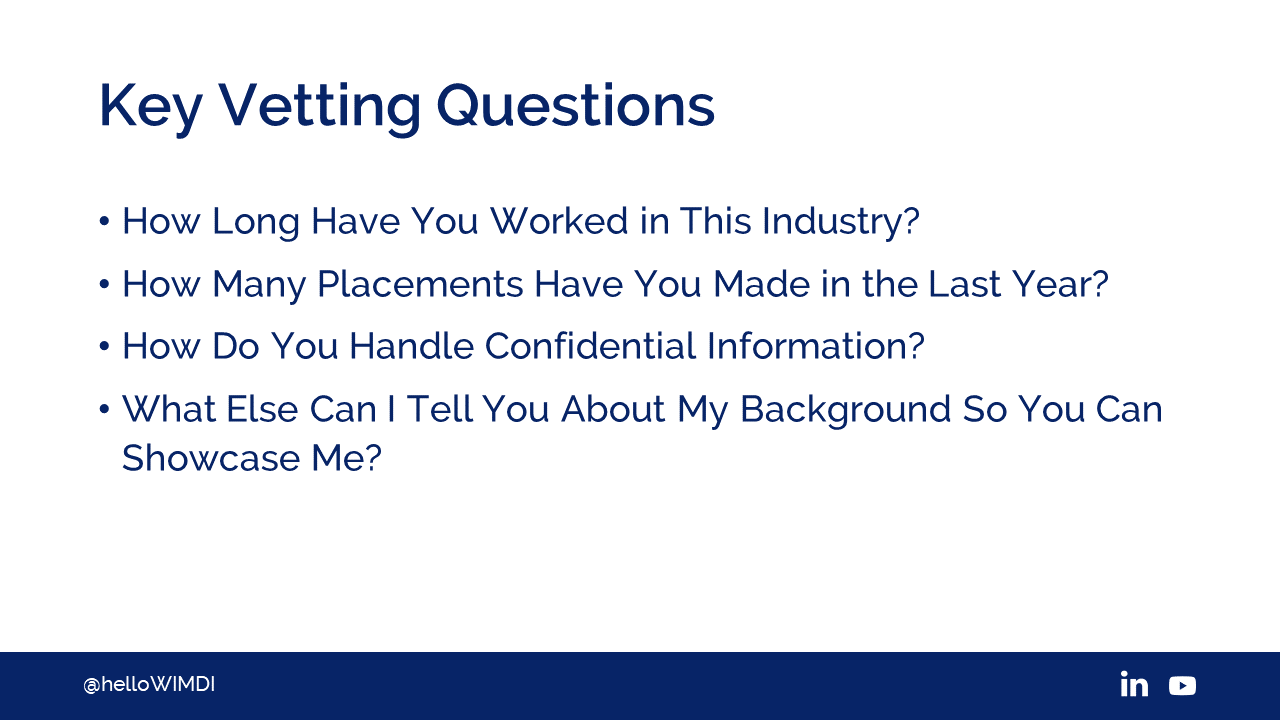
All that being said, I hope that you can find some awesome recruiters to work with. I would love to stay in touch with you.
If there's anything I can help with, whether I'm in your industry or niche or anything else, I'm happy to be a resource. I'm really good at vetting other recruiters. So, feel free to reach out to me for anything.
More Fun Stuff!
If you loved reading this transcript, you might like to watch the video or learn more about our amazing speaker! Check it out: